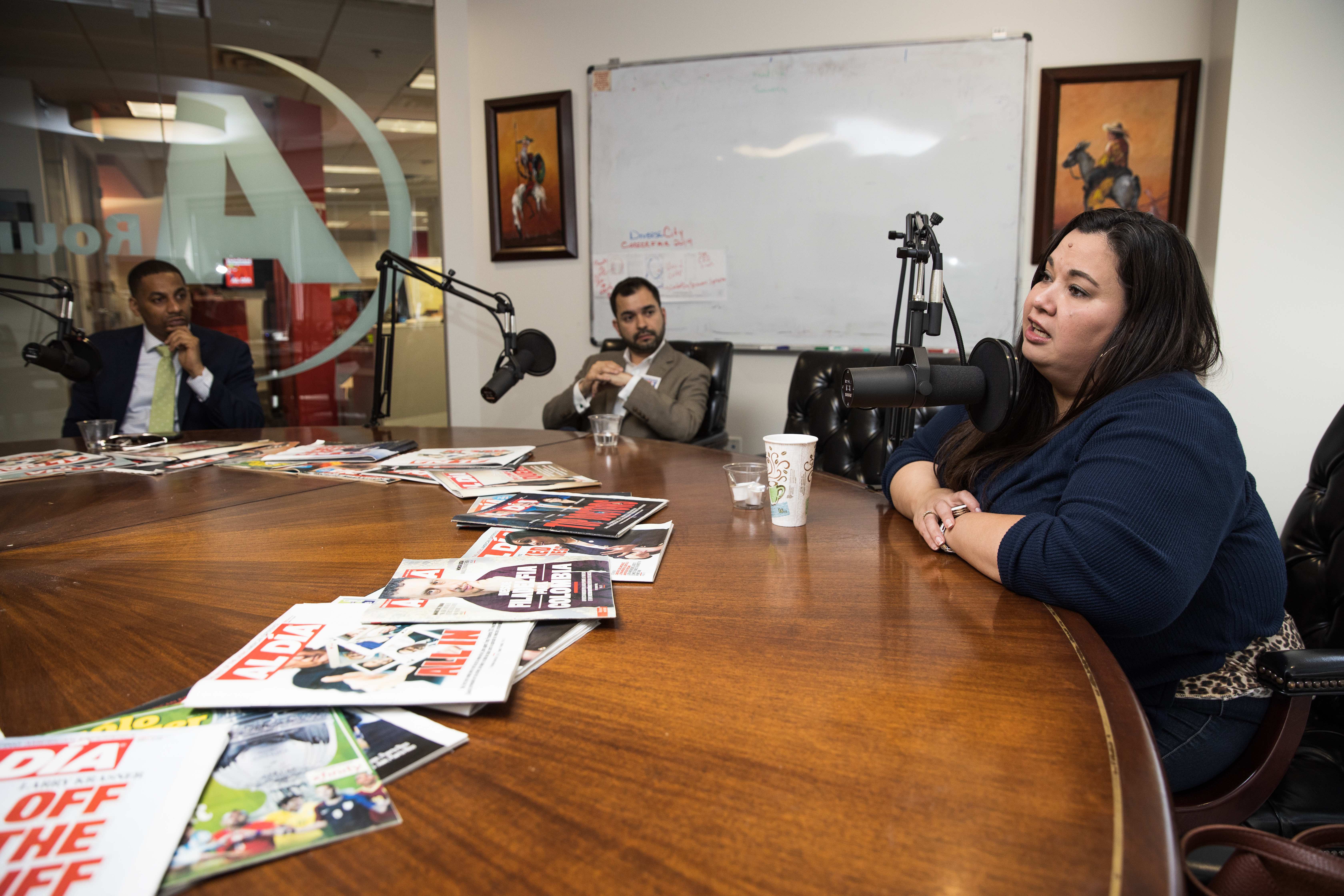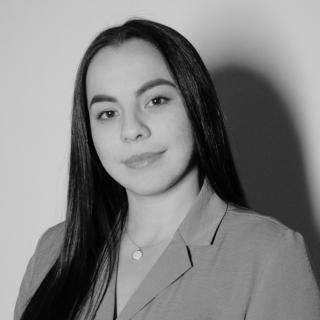
Latinx wave signals political shift in Philly politics
Across the country, a tide of non-traditional candidates has been on the rise, the purpose: to change the landscape of politics.
Philadelphia appears to be in the midst of a political shift as a record number of Latinx candidates contend for an at-large seat in City Council.
Currently, Councilwoman Maria Quiñones-Sanchez is the only Latina to hold a seat in city council, representing the 7th councilmanic district. She is up for reelection against her opponent, State Representative Angel Cruz.
During a recent roundtable discussion at the AL DÍA Multimedia Newsroom, Latinx candidates Edwin Santana, Deja Lynn Alvarez, Erika Almirón, and Fernando Treviño shared their views on what a surge of Latinos in City Council could mean for Latinos, as well as other communities in Philadelphia.
Also a Latinx candidate for an at-large seat, Adrián Rivera-Reyes did not attend the roundtable discussion but was later interviewed on the subject.
“I’ve said from the beginning that representation matters, and I think that this year, more so than ever, as far as for the city council race, we’re seeing more representation from more diverse backgrounds,” said candidate Deja Lynn Alvarez.
This pool of Latinx candidates includes an immigrant from Mexico, the daughter of Paraguayan immigrant parents, the son of a Dominican mother, the daughter of a mixed-race family, and a Puerto Rican millennial.
“We go to the neighborhoods where it's highly immigrants or majority Latinx and we see how these neighborhoods have been neglected. If their neighborhoods don't have a voice and don't see someone like themselves on council, it feeds into this narrative of not being able to move forward,” said candidate Adrián Rivera-Reyes.
This frustration of not having people in office that represent the growing diverse communities of Philadelphia is what has given the wave of Latino candidates momentum.
“I do believe that having candidates that look like those voters is very, very, important, and the same thing has to go for our elected officials or city employees — they should look like the communities they represent [...], so I do believe that is very important for our community to take the next step and break from that kind of vicious cycle of always talking Latino politics in the 7th District,” said candidate Fernando Treviño.
“This is about the city where we live, and we work — and we represent communities around the city, not only in the 7th district,” he added.
These candidates hope to get the needle moving on implementing policies to bolster immigrant rights, provide better access to education, and strengthen economic mobility.
“I believe that the time is perfect, the time is now for black and Latino communities to start moving policies, especially in Philadelphia. We make [up] 66 percent of the population, we are the majority of this city but none of the policies represent us well,” said candidate Edwin Santana.
“When we look at education, black and Latinos are the ones being failed — when we look at crime and criminal justice, black and Latinos are the ones who are failed,” he added.
It’s still up to the voters to cast their votes, but candidates are optimistic about the election.
“I think what’s also exciting is that this changes the game for the electorate. You’re going to see, I think, doubling of the Latinos voting because they’re going to actually be excited to be voting for people who look like them, and who are like them,” said candidate Erika Almirón.
Some candidates say this wave has been energized by the current anti-immigrant rhetoric present in national politics.
“I think that we are seeing all these massive attacks from the federal government and from the president, and so I think it is actually natural for communities like ours, that are under attack, to say no we want a seat at the table, enough of these attacks on our people — we should actually be leading as well,” said Almirón.
Treviño, who would become the first immigrant in city council if elected, says the political climate hits close to home for him.
“For me, it’s very difficult not to take it personal, and I have been asked and accused of, ‘Oh you’re trying to use the national rhetoric for your campaign,’ but it’s personal. It’s personal for a bunch of us, we have been there, we have lived that, so it’s impossible not to have a direct line or relation with what's happening with the white house,” said Treviño.
A longtime advocate for social justice and first transgender candidate, Alvarez says the current political climate has pushed the country back 100 years, especially in the LGBTQ community, and it’s time to start moving forward.
“I think it woke me up a little more, it made me realize, wait a minute, nope we need more voices, we need more voices in government, we need more voices that can make legislation and help with policies that can continue moving us in the direction that we need to go,” said Alvarez.
But not all the candidates were influenced by the current political climate.
“Being a translator at 5 years old for my mother who did not speak the English language and seeing that when we went to public services there were not enough services for the Latino community there, so a 5-year-old had to play translator, or leave a day out of school because your mom had to go to the doctor’s appointment and you had to translate with the doctor — those are all the reasons why,” said Santana, adding that it's been his life experiences that influenced his decision to run, not President Trump.
If there is something that the nation understood from Trump’s victory in the presidential race in 2016, it’s that a political newcomer can win an election.
“I finally took a good hard look and said, wait a minute, hold on, why have we been looking at politicians as though they have to be these perfectly bred, perfectly polite well-spoken and highly educated folks that come from a certain background?” said Alvarez.
“No, what we need is people that know how to get out and fight for people,” she continued.
RELATED CONTENT
These candidates say that although their backgrounds are not traditional, their experience as activists, organizers, and leaders is what has given them the strength and expertise they’ll need to get out there and fight as legislators.
“If my background is simply reading budgets, or doing IT, or something along those lines, that’s not giving me the fighting experience necessary to get out there and fight for those that need people to fight alongside them,” said Alvarez.
“I’ve spent so many years understanding what movement building is — that it’s one thing to talk about what needs to change, it’s another to understand how to make change and how to challenge power,” said Almirón, executive director of Juntos, an immigrants’ rights organization.
For Treviño, it’s been his work both inside and outside of government that he says has prepared him to get the job done.
“My whole career I have defended the rights of immigrants, worked with underserved communities, and empowered minority voters to have a voice in the political process,” said Treviño.
In the case of Rivera-Reyes, he says his background as a cancer research scientist will lend fresh perspective to council.
“My entire training and career has been about finding solutions to that giant question, and so I bring that with me,” said Rivera-Reyes. “I bring that drive, that determination to find solutions, to look at facts and data, and to engage with communities when implementing and finding solutions to the problems that we have,” he added.
Although Santana agrees activism work is important, he says that for him, it’s his business owner experience that will help him push policies forward.
“My platform is focused on economic justice and workforce development so my role as a CEO and a business owner for over a decade plays a big role. I think financial freedom is our only hope in the Latino and black community,” said Santana.
Aside from the outcome of the elections, there is already one victory the Latino candidates have already won.
This will be the first time that Latino names can go on the ballot with accent marks on the actual spelling, something Almirón says she had to fight hard for when she began her candidacy.
“Almirón with an accent on the “O” is my last name and I want that represented on the ballot because I’m proud of it. My parents carried that name for me all the way here, I’m not changing it,” said Almirón.
While all five of these at-large candidates may be Latinx, they say it’s time to stop painting Latinos in the city with one broad paintbrush and acknowledge and embrace their differences.
“It showcases one of the most beautiful things about Philadelphia in general, that we are a city of possibilities, that we are a city where in this case Fernando being from Mexico and me coming from Puerto Rico, and the other candidates that are first generation, it says that our city is, first, ready to have people like us leading, and second, that we are a welcoming and open city to good people with good ideas,” said Rivera-Reyes.










LEAVE A COMMENT: